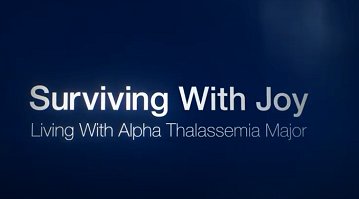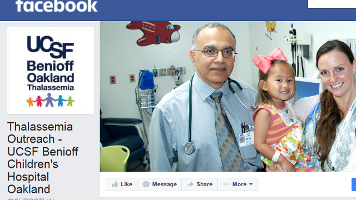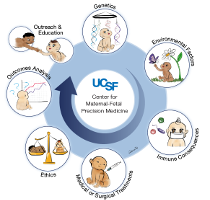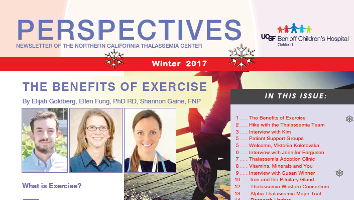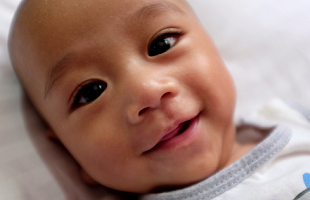Pregnancy and Motherhood: The Experience of Four Women with Thalassemia
By Meghan Foe, Guest Editor
May 2020
When I was a thirteen, I attended a thalassemia conference where there was a lecture about thalassemia and fertility.
At the time, I did not understand much about what was being said -- there was a lot of scientific talk about low hormone levels and the possibility of freezing eggs.
But I do remember coming away with a distinct feeling that pregnancy for young women like me, who have severe forms of thalassemia,
would be difficult and unlikely. I did not think much about this at the time; someone had taught me enough about feminism to
persuade me that I probably would have a productive and interesting life regardless of whether or not I had biological babies.
But when I began working at BCHO and met women with thalassemia who had biological children, I realized there was much more to
the story of having thalassemia and becoming pregnant than I had initially thought. And when I learned that other young women like me
had doubts and questions about their own ability to have children, it was clear that a story about having thalassemia and having biological children -- from the perspective of the women themselves -- needed to be written.
I interviewed four women with thalassemia, all of whom received frequent blood transfusions. Two had beta thalassemia major, and two had E/Beta thalassemia. Their ages ranged from mid-twenties to early forties. Their children's ages ranged from infants to pre-teens, and one woman was pregnant with her first child at the time of our interview.
Beliefs about Pregnancy
Like me, all but one of the women I interviewed expressed that their expectations about pregnancy had been low. These low expectations stemmed from the symptoms and complications they were experiencing, such as having irregular periods or having an enlarged spleen. One woman recalled getting blatant misinformation from her previous providers about her ability to have children. "I remember going to the doctor, and they were like, you can't have kids," she told me.
This belief likely contributed to the fact that nearly all of the women I spoke to did not discuss the possibility of pregnancy in-depth with their doctors until they were either already pregnant or had reached the time in their life when they decided they wanted to become pregnant. For some of them, pregnancy was simply not something that they themselves were thinking about when they were teens or young adults, let alone something they wanted to speak to their doctors about. But one woman claimed that this wasn't her reason for not bringing up the topic early on. " I don't feel shy or embarrassed in any way," she said. "I am so comfortable with them because they've known me since forever." Her real reason for not bringing it up, she explained, was because she "didn't want to hear negative stuff about it."
Iron Overload, Reproductive Ability, and the Importance of Early Conversations
This is something I discussed with Dr. Titi Singer, a thalassemia physician at BCHO and one of the leading experts in exploring thalassemia and fertility. She explained that it is quite common for the conversation around pregnancy to be difficult. But she maintains that it is extremely important for both patients and providers to have conversations about reproductive health and pregnancy early -- in their teens even.
For individuals with thalassemia -- particularly those with severe forms like beta thalassemia major -- this urgency stems from the recognition that the iron overload that comes from frequent, lifelong blood transfusions can affect their reproductive ability. Iron can deposit in the pituitary gland, a small organ in the brain which is responsible for stimulating or producing reproductive hormones in our body. These hormones, such as LH, FSH, estrogen, and testosterone, are essential to our ability to reproduce. While iron in the pituitary can be removed if patients are diligent and aggressive with their iron chelation therapy, decades of iron accumulation will eventually make the pituitary shrink -- something which is irreversible. For women, iron can also deposit in the ovarian tissue, causing damage to the eggs.
This is not just something that women need to be careful of. Men, who are equally responsible for reproduction, may have pituitary shrinkage too. Iron can also accumu-late in other male reproductive organs, making them less fertile. Thus, it is of great importance that young people who have even the slightest chance of wanting to have biological children in the future maintain low iron levels and monitor their endocrine function.
Taking the First Steps: Assessing Fertility
The first step to planning for pregnancy for women with thalassemia is often a referral to a fertility specialist to assess "fertility potential" -- in other words, the body's ability to reproduce without assistance. For the women I interviewed, the fertility specialist ordered blood tests of their hormone levels and ultrasounds to check the number of eggs or follicles they had.
"It was just like any other couple who goes through fertility help would go through," explained one woman.

Fertility Treatments for Women with Thalassemia
Two of the women I interviewed became pregnant without any medical assistance. Both women had E/beta thalassemia, an intermediate form of thalassemia that usually requires fewer blood transfusions. This is quite common according to Dr. Singer. Nearly all women with intermediate forms of thalassemia like E/beta thalassemia can become spontaneously pregnant. In contrast, 70 to 80% of women with beta thalassemia major will need some kind of intervention to become pregnant.
Yet this is not any reason to lose hope, Dr. Singer insists. Women with thalassemia who produce very low levels of hormones, do not get regular periods, and have only a few follicles can become pregnant with medical assistance. There are two main possibilities: for women with adequate follicle counts, they may require stimulation with reproductive hormones; for women with lower follicle counts, in vitro fertilization (IVF) -- where an egg or multiple eggs are taken from the woman's ovary, fertilized with sperm outside of the body, and transplanted back into the woman’s ovary -- is likely necessary. Both of the women with beta thalas-semia major whom I interviewed only needed hormone stimulation to become pregnant.
Staying Healthy During Pregnancy
Once the women became pregnant, the focus turned to ensuring that they and the pregnancy remained healthy. They underwent a series of tests, much like the annual testing done for comprehensive thalassemia care: the T2*, SQUID, DXA, ECHO, and glucose tolerance tests are done to monitor for cardiac iron, liver iron, bone density, heart function, and risk for diabetes, respectively. Cardiac tests are especially important, as pregnancy is a significant strain on the heart. As a result, experts often would not recommend pregnancy for women who have very high levels of iron in their heart -- or who are at risk for heart failure -- until they can reverse the damage.
This is especially important since physicians often recommend that women stop their iron chelation therapy during the pregnancy. Women with very high iron overload may stay on Desferal -- the only iron chelation therapy whose molecule is so large that it cannot pass from the mother to the fetus through the placenta. Many women may also need more blood transfusions than usual during pregnancy.
In addition to the heightened level of thalassemia care necessary during pregnancy, the women were followed by obstetrician/gynecologists (OB/GYNs). All of the women I interviewed were followed by high-risk OB/GYNs or perinatologists, due to their medical histories. The women reported that the medical appointments could get overwhelming. "The OB/GYN is every week or two, and then I have another extra appointment with them to make sure [the baby] is okay since I have thalassemia, and then my blood transfusion here," one woman described. "It's just like constant appointments."
Seeing multiple physicians who specialized in different things presented additional communication barriers, too, especially since many of the OB/GYN providers did not know much about thalassemia. "The prenatal doctors were always looking stuff up about thal," one woman recalled. "They would be like, 'well yeah, we should be worried about this' but not really know what applied to me or didn't apply to me."
Another woman described being nervous about planning for a blood transfusion after delivery. "I was really nervous about the process of them getting the right blood and getting it washed," she said. "It seemed a little bit more confusing to them for some reason. But finally they got it right." It helped, all of the women stated, that their hematologists were very involved in the pregnancy and often communicating with their OB/GYNs about their medical needs.
Genetic Inheritance of Thalassemia
Individuals with thalassemia who want to have biological children face the risk that their child may have thalassemia if their reproductive partner has the trait or the disease, as well. Every woman I interviewed remember their hematologist talking to them about their child's chance of having thalassemia during their pregnancy.
Yet perspectives about preventing thalassemia varied greatly among the women I interviewed. Two of the women learned early on that their partners did not have thalassemia trait, so there was no chance that their child could have a severe form of thalassemia.
Another woman, who was pregnant at the time of our interview, expressed fear about her child having thalassemia. "I didn't know if they would end up having what I have," she said. But insurance would not cover the test to see if her partner had thalassemia trait, and the prenatal diagnosis test was also costly. She took it all in stride though, stating, "I guess we just have to wait until after she gets here!"
In contrast, however, the last woman I interviewed had very little concern about the risk of her children having thalassemia during her pregnancies. "If they for some reason happen to have thalassemia, I think I am going to be okay," she said. Her views towards thalassemia were informed by her own abilities and quality of life, "I can walk, drive, have a job, I don't need a lot of help, so I think the boys are going to be both pretty fine."
Building a Support System
All of the women stressed the importance of having a strong support system around them during their pregnancies -- something that is important regardless of whether someone has thalassemia or not. For these women specifically, the significance of having a medical support system was invaluable. "It was important to get a care team together .. to talk about stuff they think is important for you to be aware of, to talk to you and each other about it," one woman described.
Family and friends were another important source of support. However, many of the women described a temptation to keep their pregnancies secret -- even after the first trimester, when the majority of prospective parents begin to share the news. "I didn't tell anyone right away, because I was worried about the baby with all the risk factors," one woman explained. Another woman described how -- even when both she and her husband knew she was pregnant -- she was cautious to show her excitement about the pregnancy to him. "I kept it internally, but like slim chances so let's not show him," she said.
A "More or Less Normal" Experience
Despite their worry, all of the women described feeling like their pregnancies were "more or less normal." One woman described feeling even better than usual. "I loved pregnancy," one woman exclaimed, "it was probably the most happiest, joyful -- maybe the second most happiest time in my life. I always said, if I could concoct whatever hormone mixture and levels I had, I'd make it rich."

All of the women who were working when they became pregnant continued to work throughout the pregnancy. "I waited until my water broke during my first pregnancy," one woman exclaimed. "I was just like, 'I guess the baby's ready to come, I'm not going to work anymore!"
Of the three women who had already gone through delivery when I had interviewed them, two underwent C-sections and one did not. C-sections are more common among women with thalassemia, usually because these women tend to be smaller and have smaller pelvises. It is recommended that women prepare to receive a blood transfusion following childbirth. Women with thalassemia also may be at higher risk for forming blood clots and getting infections -- particularly if they have had their spleen removed. Thus, doctors often recommend that they take blood thinners like aspirin and antibiotics after delivery.
Being a Parent with Thalassemia
I was curious about how these women talked to their children about thalassemia. Did they hide parts of their health care from their children, or did they show it to their children from an early age? The three women who already had children told me that they prioritized making thalassemia as normal as possible for their children. "I always talk about it like brushing your teeth," one woman described. "You always have to brush your teeth, keep them healthy, right? Same thing." Another woman told me about how her son is good at recognizing her physical limitations. "He will be like, 'oh we should do something that's not that hard,' or if they're looking for chaperones on a field trip, [he'd ask] 'Are you going to feel good that day? Would you be able to walk for that long?"
One woman told me that having children has made her more open about having thalassemia, not just to her own children -- who are still too young to understand thalassemia -- but to others in her life. "My whole life, I've been told to keep it a secret," she told me, "there's been shame associated with it." Her desire to be more open comes in part from the recognition that she will one day have to tell her children about her thalassemia. Plus, she wants her openness to be a lesson for her children. "I want to be a good role model for them, teach them not to be ashamed of themselves, their family, any quote-unquote "flaws," she said. "I want to teach them to be honest."
This is not the only way children changed these women's relationship to thalassemia. All of the women discussed feeling more inclined to take care of themselves -- despite how difficult it could be sometimes to balance their needs with those of their children. "Nobody could ever prepare me for how consuming a child can be, emotionally, physically, every ounce of yourself," one woman said. But she was practical in her outlook, "If you start to neglect yourself, then nobody wins in that situation. Everybody loses."
 This sentiment was echoed by another woman, who was pregnant at the time of our interview. She described how her outlook towards her thalassemia treatments have changed.
"I used to be like, I am not going to drive all the way to get a blood transfusion. But since I got pregnant, I was like, okay it's for my daughter so I am going to come."
She smiled, "She makes everything worth it."
This sentiment was echoed by another woman, who was pregnant at the time of our interview. She described how her outlook towards her thalassemia treatments have changed.
"I used to be like, I am not going to drive all the way to get a blood transfusion. But since I got pregnant, I was like, okay it's for my daughter so I am going to come."
She smiled, "She makes everything worth it."

